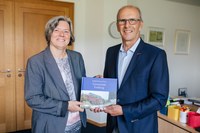What do the early modern cartographer Martin Waldseemüller, some vineyards in the Markgräfler Land, and the smell of rice pudding every Friday have in common? They're all connected to the history of the University of Freiburg and can be found in a book that's just been published by Verlag Herder. The volume with the straightforward title "University of Freiburg" describes the eventful path from the university's founding in 1457 until today. It also tells many "Stories from the University's History" („Geschichten aus der Uni-Geschichte"), which is what the second part of the book is called. Rudolf-Werner Dreier wrote the book. For more than three decades, he was the university's press spokesperson and built up the alumni organization, among other things. "I'm really happy about this book," says University of Freiburg Rector Prof. Dr. Kerstin Krieglstein. "The book isn't just very informative, it's also varied and vibrant - and it makes clear how closely the university was and is linked to the city and society," she says.
"America comes from Freiburg"
The University of Freiburg is one of Germany's oldest universities. Its long history has been determined by a struggle for autonomy and the continual pursuit of excellence in teaching and research. Again and again, its story has come to be and is shaped by outstanding individuals. Dreier's book tells of this, and includes anecdotes, peculiarities, and controversial questions, as well as stories of people and their relationship to the university. Says Dreier, "In its history, there are so many interesting facets and personalities. I wanted to capture them in a way that's accessible to everyone. A university's life comes from its people."
People, such as the cartographer Martin Waldseemüller, who created a famous map of the world as a student at Freiburg in 1507. On that map a newly discovered continent was labelled for the first time as "America." But that was only because Waldseemüller incorporated an error from the accompanying Latin text by his fellow-student, Matthias Ringsmann, who erroneously thought the Florentine explorer and navigator Amerigo Vespucci had discovered the place. "You could therefore say with some accuracy, that America comes from Freiburg," says Dreier.
Everyday tales, too
An historian and journalist, by 1991 Dreier had already become the first to write an illustrated history of the university. "But publishing a new edition of the first book really didn't make sense, because the university has rapidly grown and changed in the last 20 to 30 years," says Dreier. The many, many academic and societal changes that have taken place over a total of more than 550 years are clearly depicted in this university history. That additionally makes Dreier's book a history of routines, social life and culture as well. It includes stories such as the flight of the university into exile ahead of the French sieges, the debate on the "female question", the work of Nobel laureates, or the meaning of wine for the university.
Wine growing is a university tradition. Even at the time of its founding, the institution owned not just farmland but vineyards as well. At times, wine was even used to pay professors, and the public drunkenness of students and other members of the university bothered many a city leader. In 1984, the university again took up the tradition of viniculture when it obtained several vineyards in Markgräfler Land. The grape harvest produces around 10 thousand litres of "Uni-Wine," which is mainly served at festive events.
Vegan rice pudding
And Dreier's book isn't just about drinking, it addresses eating, too. Including the founding of the university cafeteria or "Mensa" in 1920, shortly after the end of World War One. That was a time when many students were undernourished. They were fed by nuns from the order founded by St. Vincent de Paul, the Sisters of Mercy. The construction of what is now known as Mensa I in Rempartstraße began in 1961. At that time, the price per meal was raised from 90 German pfennigs to 1.20 German marks, triggering one of the first student demonstrations. On one banner was written „Zwischen Stahl und Glas der gleiche Fr…!" -- or "between steel and glass it's still the same grub!" Later on, international cuisine enhanced the menu ("Turkey Breast Suzy Wong Style"). Then came vegetarian cooking, organic products, and a vegan offering.
Today, there's even a vegan variant of a dessert that lives on in the memories of generations of Freiburg students - rice pudding. But it costs a little bit extra. "It's funny to see how eating habits have changed and which meals mensa chefs have created over time," says Dreier. "And I was surprised how important the scent of rice pudding on Fridays is for the identity of a university," he adds.
Rudolf-Werner Dreier: University of Freiburg Verlag Herder, Freiburg, 2023. 192 pages, 359 illustrations.
Information with sample (in German): www.herder.de/dreier
Pressefotos zum Download:
 | Rector Kerstin Krieglstein and Rudolf-Werner Dreier Photo: Sandra Meyndt | |
 | Source: Verlag Herder |






